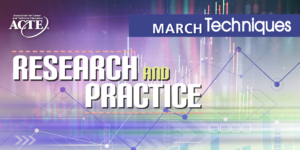Upon entering college, students often report feelings of uncertainty about which major to choose. Research suggests that access to career information supplemented with career development would assist students in transitioning to higher education or the workforce (Bradley, 2010). Career development activities can foster the growth of clearer, more intentional career goals — motivating students and ultimately in influencing success. All students may benefit from access to career development intended to provide support and tools for making confident academic and career decisions.
Background
This action research study was conducted on the campus of a community college in the rural southeastern United States. With a population of about 2,300 students, the average student age is 25. One-third (33%) of students attend full time, while 67% attend part time. The student population consists of 76% white students and 24% students of color. First-year community college students currently enrolled at the site participated in the study, and their participation was voluntary.
Methodology
The study utilized an action research methodology, which is cyclical in nature. Initially, student perceptions of existing career development at the research site were assessed through individual student interviews. Following this assessment, it was determined a seminar model would be appropriate to potentially increase student engagement in career development. A series of seminars on various career development topics was created and co-facilitated by student peers. The goal was to cultivate student connections and to ensure participants received timely, accurate communication. Data was collected from the seminars through surveys and individual interviews.
Procedures
The seminars were marketed across campus via digital flyers and email and text reminders. Participants registered for at least one seminar via Google Forms and were given the option to attend in person or virtually. Each student who attended a seminar received a gift card for their participation. During the seminars, participants completed both a pre-seminar survey and a post-seminar survey via a QR code or the direct link posted in the chat. Seventeen survey responses were collected from participants during the seminars.
The registration form asked each student if they had an interest in participating in a separate, individual interview for the opportunity to receive an additional gift card. Following the seminar, interested students received an email with more information and to schedule a date and time. Prior to their interviews, participants received an email to complete a digital consent form. Ten students were individually interviewed.
Analysis
Individual interviews were recorded and transcribed using Otter.ai. All data, including interview transcripts, survey responses, analytical memos and field notes, were input into NVivo — qualitative data analysis software — and subsequently organized by what most resonated with the researcher. An Excel spreadsheet further organized data into categories.
All interview participants were asked about how to improve career counseling services at the college. And many spoke to students’ limited knowledge of services. “I would like to see career counseling services being promoted more toward the beginning of the admissions process.”
Participants also mentioned a lack of adequate access to the seminars. Tiffany suggested offering “an option in the evening for people who are working.” Another mentioned sharing more “about resources in the community.” We, as career and technical education (CTE) professionals, can improve career development services for all students.
Results
Flexible service delivery
Students are more likely to engage in career development activities when they are presented with flexible service delivery. In recent years, higher education institutions have revised their implementation of not only instruction but support as well. Utilization of technology has become necessary to create flexible programming for student support services (Toquero, 2020). Therefore, seminars may be offered in a virtual format, and participants may be given the option to view seminar recordings later.
Informational campus culture
Students are more likely to engage in career development activities when they are well-informed of services available to them. Adequate and concise information on student support services should be shared, specifically in student success courses. The extant literature indicates that how students receive information on student support services is critically important, and student success courses are the primary avenue for sharing information with first-year students (Acevedo-Gil >amp; Zerquera, 2016; Hatch, 2017; Hatch et al., 2018).
Positive campus relationships
Students are more likely to engage in career development activities when they have positive campus relationships. This is a key component in students feeling a sense of belonging. Many student participants shared that the feeling of being known and valued was important. They also reported being aware that faculty mentor and assist students in areas beyond academics. Thoughtful instruction and mentoring are critical to positive relationships between students and faculty (Parnes et al., 2020).
Discussion
- This work can be shared and reproduced across college campuses, increasing its impact.
- Higher education professionals would benefit from infusing campus culture with a more career-minded focus.
- Student information sources, like the institution’s website, should provide details on career development services available to students.
- Virtual formats are not only possible but often ideal. When an in-person format is the better option, this work is easily adaptable. It could potentially be beneficial to have an increased emphasis on intergroup relations.
- With flexibility, career development can be conducted more widely with new and returning students.
- A strong partnership with the college’s coordinator for student success courses can help promote career development services for first-year students. Consider the additional benefits of partnering with interdisciplinary colleagues to increase students’ career knowledge and skill development.
Laura Walker-Andrews, Ed.D., is an assistant professor and program coordinator in
department of Business and Organizational Leadership at Brevard College.








